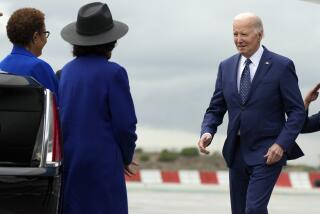Stupid House tricks
THE STATED PURPOSE of the 279-page anti-terrorism bill rammed through the House last week by the new Democratic majority was to implement the long-stalled recommendations of the 9/11 commission. But we’re still thumbing through our copy of the 9/11 report to find exactly where it recommends political grandstanding. Because that’s what the Democrats’ efforts to protect U.S. ports amount to.
The bill, passed Tuesday by a margin of 299 to 128, mandates that foreign ports scan each and every cargo container bound for the United States for nuclear material before it ships out. Large international ports would have three years to comply; smaller ones five. Each scanned container must then bear an electronic seal that, if broken, would send an automatic signal to U.S. authorities. Such seals don’t yet exist, but the bill calls for their use when the technology becomes available.
Not covered in the bill is who’s supposed to pay for all this or how much it would cost. But the implication is clear: Foreign ports and shippers would foot the bill, not the U.S. government. Thus, the U.S. would demand that all 700 worldwide ports buy, install and operate expensive and futuristic equipment if they want to keep doing business with the largest economy in the world. Yet the bill does not demand the same from U.S. ports for outbound cargo -- this is strictly a one-way deal, aimed at foreigners and private industry.
Such aggressive unilateralism could seriously damage U.S. trade relationships. It would be highly disruptive to trade, on which the U.S. economy is deeply and increasingly reliant, and would disproportionately punish Los Angeles County, which operates the nation’s biggest port complex.
The bill is not at all what the 9/11 commission had in mind. The government, the report recommended, should “identify and evaluate the transportation assets that need to be protected, set risk-based priorities for defending them, select the most practical and cost-effective ways of doing so and then develop a plan, budget and funding to implement the effort.” In other words, be realistic. The House bill instead aims at the fantastical goal of inspecting 100% of cargo, while ignoring costs and setting aside no funding.
Much more work is needed to secure American ports against terrorist attacks, such as setting standards on cargo inspection records and coming up with detailed emergency plans. But these are not the kinds of measures that lend themselves to legislation. The technology for scanning containers for radiation is in its infancy and is capable of detecting only the most primitive of “dirty” bombs; it will probably take years to work out the technical and logistical bugs. Congress can help by setting aside funds to get the research done, not by political posturing.
Democrats are eager to prove that they, not Republicans, deserve to be considered the more muscular defenders of the homeland. But haste and over-reaching do not equal muscle. The House anti-terror bill has some worthwhile provisions, but we’re counting on the Senate to strip out its worst elements, starting with the counterproductive mandate on foreign ports.


